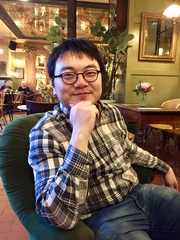个人资料
- 部门: 心理与认知科学学院
- 毕业院校: 波恩大学
- 学位: 哲学博士
- 学历: 博士研究生
- 邮编: 200062
- 联系电话:
- 传真:
- 电子邮箱: yanghu@psy.ecnu.edu.cn
- 办公地址: 俊秀楼508室
- 通讯地址: 中山北路3663号
教育经历
2006年9月- 2010年6月 华东师范大学 理学学士 应用心理学 2010年9月- 2013年6月 华东师范大学 理学硕士 基础心理学 2013年10月-2017年4月 波恩大学(University of Bonn) 哲学博士 基础心理学
工作经历
2017年4月-2019年3月 法国国家科学中心(CNRS)博士后 2019年4月-2021年8月 北京大学 博士后(博雅计划) 2021年9月至今 华东师范大学 (准聘)副教授
个人简介
胡杨,华东师范大学心理与认知科学学院(准聘)副教授,博士生导师。本硕就读于华东师范大学心理与认知科学学院,2017年博士毕业于德国波恩大学。随后在法国国家科学中心(CNRS)以及北京大学完成博士后训练。主要研究方向为社会神经科学(神经经济学)与社会心理学。采用行为决策任务范式、计算建模以及认知神经科学(包括fMRI、tDCS、眼动)技术手段,探究不同类型社会道德决策(如腐败、第三方正义)的认知神经基础以及影响因素。截止目前,已在SCI/SSCI期刊发表论文28篇,其中以责任作者身份完成的研究发表在eLife, Psychological Science, Journal of Neuroscience, Neuroimage, Psychoneuroendoctrinology, Social Psychological and Personality Science, British Journal of Social Psychology, Social Cognitive and Affective Neuroscience等神经科学和社会心理学领域高影响力期刊,合作研究发表PNAS, Nature Reviews Psychology, Journal of Neuroscience, Proceedings of Royal Society-B: Biological Sciences, Human Brain Mapping等重要期刊上。现承担国家自然科学基金青年项目、上海市自然科学基金项目,参与科技部重大项目子课题、国家自然科学基金委重点项目、教育部中央高校优秀青年团队项目等。更多信息详见 CV_YangHU_202312_update.pdf。 CV_YangHU_202312_update.pdf。
社会兼职
中国心理学会心理学与社会治理专业委员会委员 华东师范大学“新文科创新平台”研究骨干
华东师范大学纪检监察研究院廉政心理研究中心副主任 华东师范大学“心理学与计算机”双学位2021级本科“青年班主任”
研究方向
采用行为实验、计算建模以及认知神经科学技术手段(如功能性磁共振成像、脑电、脑磁图、无创脑刺激、眼动、激素),着重考察: 1. 道德与社会决策(如腐败、第三方正义)的计算机制及神经基础; 2. 社会情绪(如内疚)与道德认知的交互影响及其认知神经基础; 3. 道德与社会行为的个体差异(如人格特质)、异常机制(如自闭症)及其认知神经基础
在上述基础研究成果的指导下,未来将依托纪检监察研究院廉政研究中心,结合多学科研究方法与思路,进一步开展应用及转化研究,主要包括: 1. 基于多模态数据的腐败行为(及其他社会道德相关行为)预测研究; 2. 基于认知机制的反腐败行为(及其他不道德行为)干预研究
招生与培养
研究生招生方向: 1. (学术型)硕士 2. 博士
研究生招生要求: 1. 对研究主题(可参见“研究方向”板块)有浓厚兴趣; 2. 具有优良作风品质(包括但不限于:做事认真、踏实肯干;有较好问题解决、情绪调节、抗压、沟通、团队协作能力;与人为善、乐于助人); 3. 具有心理学及相关学科专业背景(包括但不限于:计算机科学、神经科学、经济学、统计学、生物医学工程等),愿意学习跨领域知识与技能; 4. 有一定的编程或数据处理基础(熟练掌握R、Python或Matlab中的至少一种)
学生培养: 1. 研究生:目前独立指导3名(学术型)硕士研究生,合作指导3名博士研究生 2. 本科生: (1)本科毕业论文 (2)各类比赛 课题组整体氛围:团结、紧张、严肃、活泼
(源于https://baike.baidu.com/item/团结、紧张、严肃、活泼/23000504)
欢迎感兴趣的同学(含本科生)加入!有意推免或申研者请提前联系。
开授课程
本科生课程:《认知方法导论》、《心理学研讨与实践》、《心理学导论》(辅修) 研究生课程:《基础心理学概论》、《基础心理学研究前沿》、《高级心理学研究方法》、《多学科视域下的廉政心理研究》、《社会情绪与社会决策脑认知研究专题》
科研项目
1. 国家自然科学基金委员会青年项目“内疚情绪影响腐败行为:内疚对象的调节作用及其认知神经基础”(32200853),项目主持人,起讫日期:2023.1-2025.12,在研 2. 上海市自然科学基金委员会面上项目“人际关系视角下的腐败行为:来自计算建模与脑成像的证据”(23ZR1418400),项目主持人,起讫日期:2023.4-2026.3,在研 3. 科技创新2030“脑科学与类脑研究”重大项目“中国学龄儿童脑智发育队列研究”子课题35“情绪与社会技能发展的脑网络基础及分化机制”(2021ZD0200535)子任务“个体差异视角下不同类型社会行为与脑网络的发展规律”,项目主持人,起讫日期:2022.1-2026.12,在研 4. 中国博士后基金会面上项目“第三方正义行为的计算认知神经机制:决策过程视角” (2019M660007,一等资助),项目主持人,起讫日期:2019.11-2021.3,已结题 5. 国家自然科学基金委员会重点项目“基于神经数据与关联行为的群体协同决策机制、建模与决策方法研究”(71942001),参与,起讫日期:2020.1-2024.12,在研
学术成果
Selected Publications († Equal Contribution, * Corresponding Author [CA]; for full publication list, please check  PublicationList_YangHU_202311_update.pdf; for non-first coauthor or non-CA papers, please contact first author or CA for pdf): PublicationList_YangHU_202311_update.pdf; for non-first coauthor or non-CA papers, please contact first author or CA for pdf):
†Qiu, S., †Tang, Y., Yu, H., Xie, H., Dreher, J-C., *Hu, Y., & *Zhou, X. (2024). Toward a Computational Understanding of Bribe-taking Behavior. PsyArXiv, https://doi.org/10.31234/osf.io/frbkp Hu, Y., Qiu, S., Wang, G., Liu, K., Li, W., *Yu, H., *Zhou, X. (2024). Are Guilt-Prone Power-Holders Less Corrupt? Evidence from Two Online Experiments. Social Psychological and Personality Science, 15(4), 430-438. 2023_SPPS_Are Guilt-Prone Power-Holders.pdf 2023_SPPS_Are Guilt-Prone Power-Holders.pdf [Media: SPSP: https://spsp.org/news/press-releases/guilt-prone-people-corruption?utm_source=hootsuite&utm_medium=&utm_term=&utm_content=&utm_campaign=; UC Santa Barbara: https://www.news.ucsb.edu/2023/021101/people-power-who-are-guilt-prone-are-less-likely-be-corrupt; StudyFinds: https://studyfinds.org/people-less-likely-accept-a-bribe/; EurekAlert!: https://www.eurekalert.org/news-releases/989684; 华东师范大学官网: https://www.ecnu.edu.cn/info/1094/63176.htm; 心理与认知科学学院官网: https://mp.weixin.qq.com/s/ICUsl8vWWqTXNmeLgTU4iw] †Tang, Y., †*Hu, Y., Zhuang, J., Feng, C., *Zhou, X. (2024). Uncovering Individual Variations in Bystander Intervention of Injustice through Intrinsic Brain Connectivity Patterns. Neuroimage, 285, 120468. Liao, J., Ou, J., *Hu, Y., Tobler, P. N., & *Wu, Y. (2023). Testosterone administration modulates inequality aversion in healthy males: evidence from computational modeling. Psychoneuroendocrinology, 106321.  2023_PNEC_Testosterone administration modulates inequality aversion.pdf 2023_PNEC_Testosterone administration modulates inequality aversion.pdf Hu, Y., †Philippe, R., †Guigon, V., †Zhao, S., Derrington, E., Corgnet, B., . . . Dreher, J-C. (2022). Perturbation of right dorsolateral prefrontal cortex makes power holders less resistant to tempting bribes. Psychological Science, 33(3), 412-423. 2022_PS_Perturbation of Right Dorsolateral Prefrontal Cortex.pdf 2022_PS_Perturbation of Right Dorsolateral Prefrontal Cortex.pdf [Media: CNRS: https://www.insb.cnrs.fr/fr/cnrsinfo/la-perturbation-du-cortex-prefrontal-dorsolateral-rend-plus-sensible-la-corruption]
Hu, Y., Hu, C., Derrington, E., Corgnet, B., *Qu, C., & Dreher, J-C. (2021). Neural basis of corruption in power-holders. eLife, 10, e63922.  2021_eLife_Neural basis of corruption in power-holders.pdf 2021_eLife_Neural basis of corruption in power-holders.pdf †Hu, Y., †Pereira, A., Gao, X., Campos, B., Derrington, E., Zhou, X., Cendes, F., *Dreher, J-C. (2021). Right temporoparietal junction underlies avoidance of moral transgression in Autism Spectrum Disorder. Journal of Neuroscience, 41(8), 1699-1715.  2021_JoN_Right Temporoparietal Junction Underlies Avoidance.pdf 2021_JoN_Right Temporoparietal Junction Underlies Avoidance.pdf
†*Qu, C., †*Hu, Y., Tang, Z., *Dreher, J-C. (2020). Neurocomputational mechanisms underlying flexible immoral decisions benefiting self and others: an fMRI investigation. Social Cognitive and Affective Neuroscience, nsaa029.  2020_SCAN_Neurocomputational mechanisms underlying immoral.pdf 2020_SCAN_Neurocomputational mechanisms underlying immoral.pdf †*Hu, Y., †Ma, J., †Luan, Z., Dubas, J., *Xi, J. (2019). Indirect reciprocity in adolescents: Evidence from incentivized inequality-related economic paradigms. Journal of Adolescence, 74, 221-228. 2019_JoA_Adolescent indirect reciprocity.pdf 2019_JoA_Adolescent indirect reciprocity.pdf †Hu, Y., †*Fiedler, S., Weber, B. (2019). What drives the (un)empahtic bystander to intervene? Insights from eye-tracking. British Journal of Social Psychology, 9(3), 733-751.  2020_BJSP_What drives the (un)empathic bystander to intervene.pdf 2020_BJSP_What drives the (un)empathic bystander to intervene.pdf *Hu, Y., †He, L., †Zhang, L., Wölke, T., Dreher, J-C., Weber, B. (2018) Spreading Inequality: Neural computations underlying pay-it-forward reciprocity. Social Cognitive and Affective Neuroscience, nsy040. doi: 10.1093/scan/nsy040  2018_SCAN_Spreading inequality.pdf 2018_SCAN_Spreading inequality.pdf
†*Hu, Y., †Strang, S., Weber, B. (2015) Helping or punishing strangers: Neural correlates of altruistic decisions as third-party and of its relation to empathic concern. Frontiers in Behavioral Neuroscience, 9:24. doi: 10.3389/fnbeh.2015.00024  2015_FBN_Helping or punishing strangers.pdf 2015_FBN_Helping or punishing strangers.pdf Hu, J., †Hu, Y., †Li, Y., *Zhou, X. (2021) Computational and neurobiological substrates of cost-benefit integration in altruistic helping decision. Journal of Neuroscience, 41(15), 3545-3561.
*Yin, L., Hu, Y., Dynowsky, D., Li, J., Weber, B. (2017). The good lies: Altruistic goals modulate processing of deception in the anterior insula. Human Brain Mapping, 38(7), 3675-3690. doi:10.1002/hbm.23623 †Ou, J., †*Wu, Y., Hu, Y., Gao, X., *Li, H., & Tobler, P. N. (2021). Testosterone reduces generosity through cortical and subcortical mechanisms. PNAS, 118(12), e2021745118. *Yu, H., Gao, X., Shen, B., Hu, Y., Zhou, X. (2024). A levels-of-analysis framework for studying social emotions. Nature Reviews Psychology, 3, 198–213. Wu, Y., Zhang, Y., Ou, J., Hu, Y., & Zilioli, S. (2020). Exogenous testosterone increases the audience effect in healthy males: evidence for the social status hypothesis. Proceedings of the Royal Society B: Biological Sciences, 287(1931).
Book Chapter †Hu, Y., †Gao, X., Yu, H., He, Z., & *Zhou, X. (2021). Neuroscience of moral decision making. In S. D. Sala (Ed.), Encyclopedia of Behavioural Neuroscience: Elsevier.  2021_Hu et al. Neuroscience of Moral Decision Making_edited.pdf 2021_Hu et al. Neuroscience of Moral Decision Making_edited.pdf [Media: 心理与认知科学学院官网: http://psy.ecnu.edu.cn/f5/f1/c17484a390641/page.htm]
Popular Science Article/Interview
|
